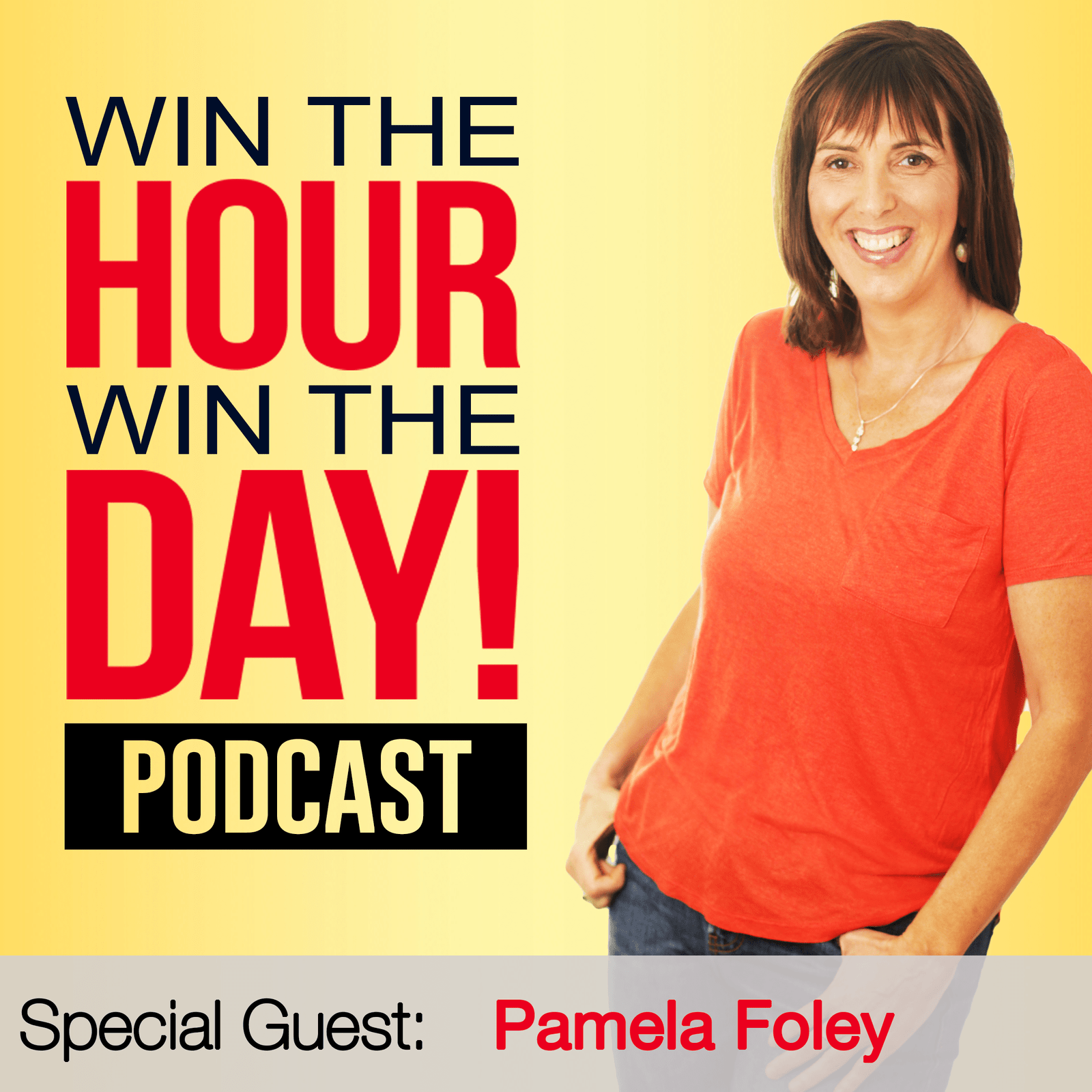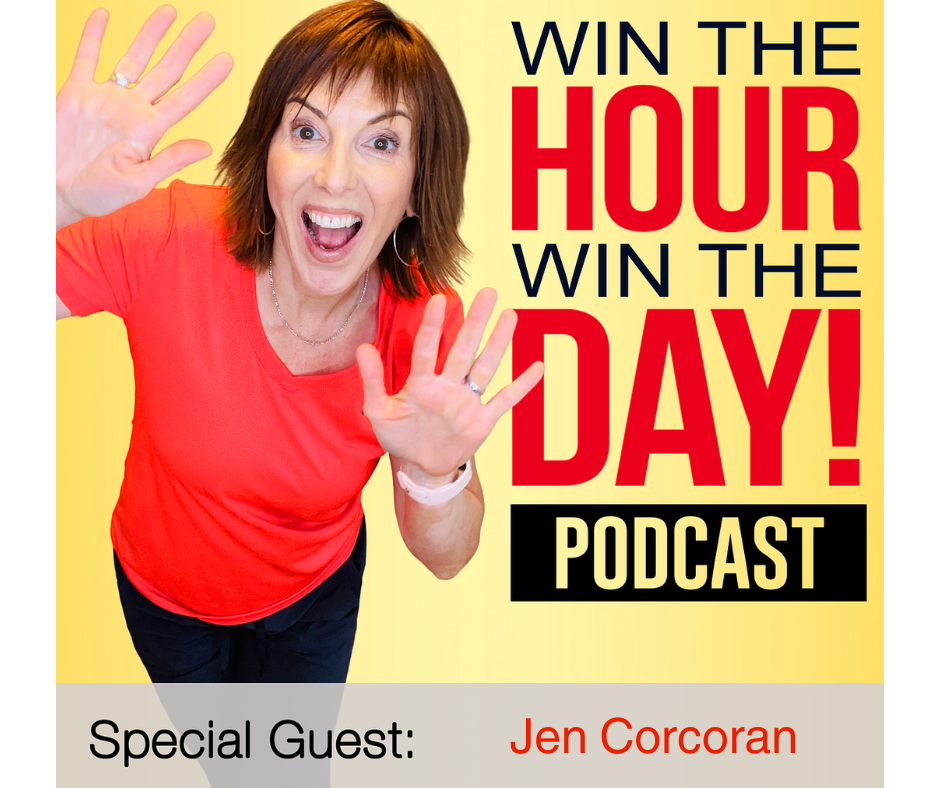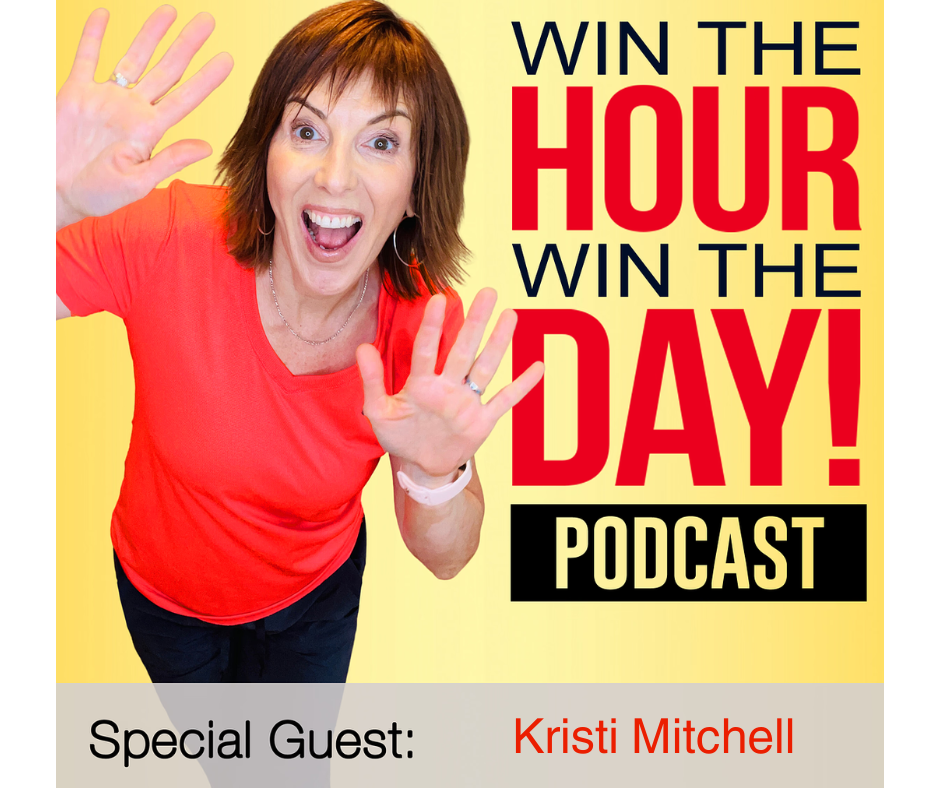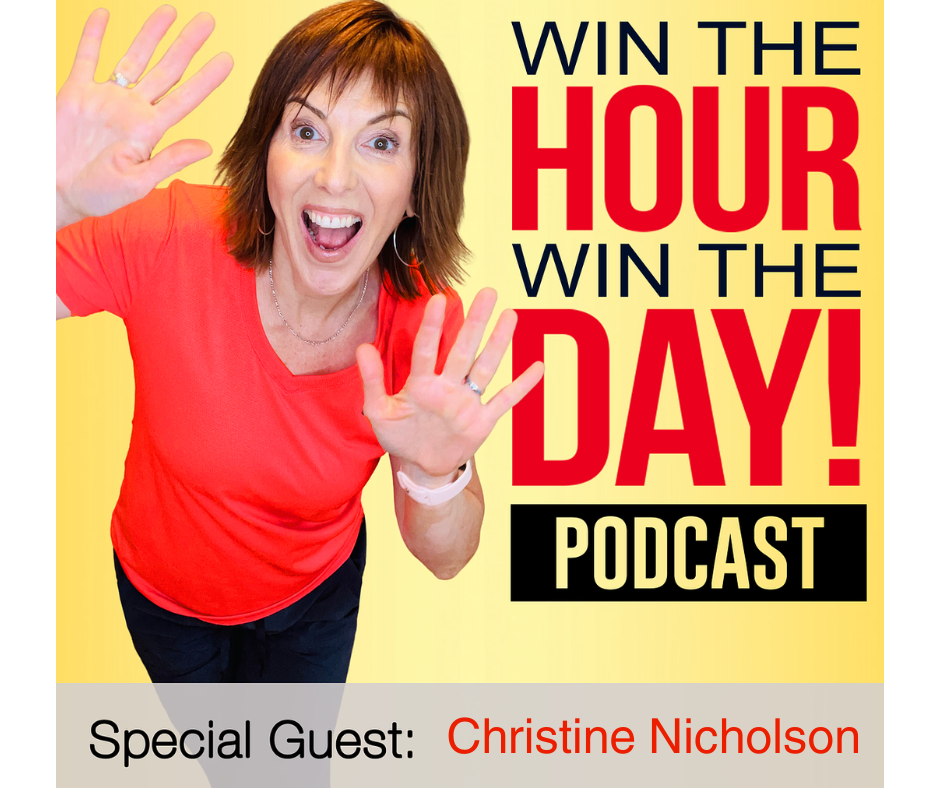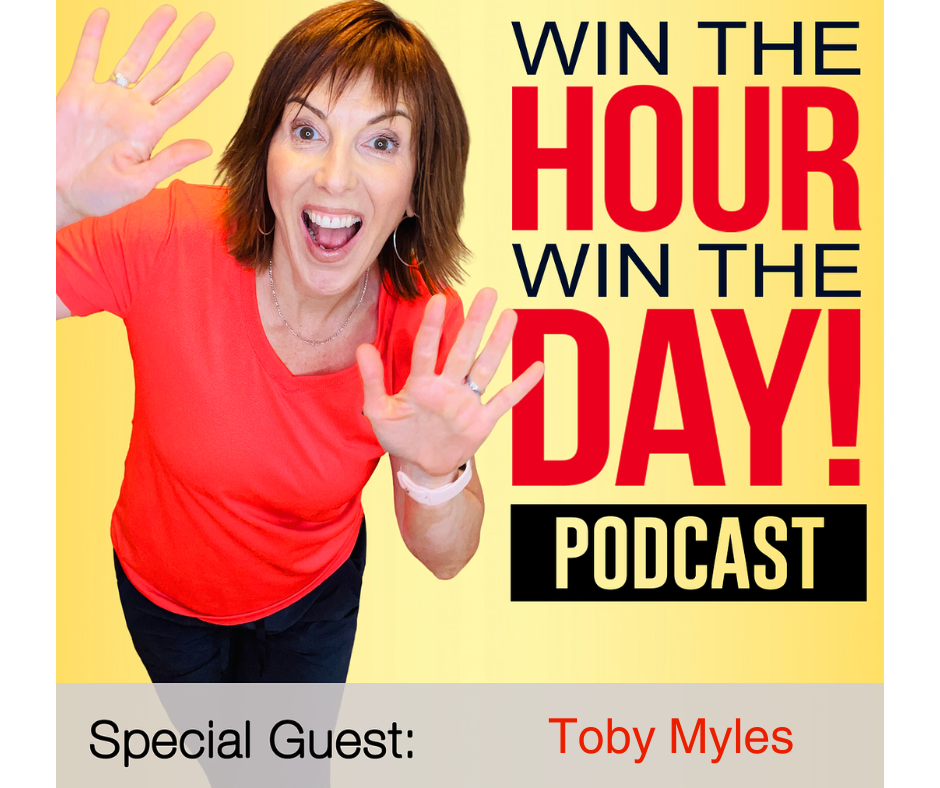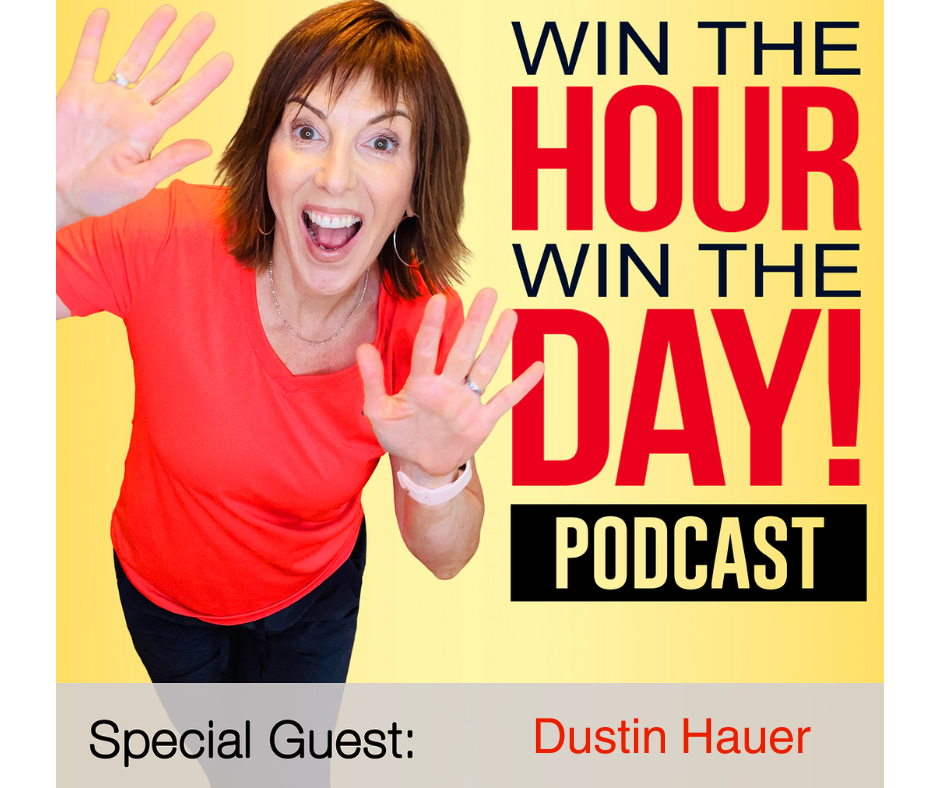Episode Summary
You can find Pamela Foley at:
Website: https://aoucreative.com/
Email: pam@aoucreative.com
LinkedIn: https://www.linkedin.com/in/pamela-parker-foley-jd/
Win The Hour Win The Day
https://winthehourwintheday.com
Pamela Foley Podcast Transcription
[00:13:05]Kris Ward: Hey, everyone. Welcome to another episode of Win The Hour Win The Day. And I am your host, Kris Ward. And today we have Pam Foley in the house, and she’s gonna talk to us about SEO copywriting that sells. Well, who couldn’t use some of that. Welcome to the show, Pam.
[00:13:23]Pamela Foley: Thanks Kris. Thanks for having me. I’m super excited to be here and I’m always excited about copywriting this. So..
[00:13:28]Kris Ward: Okay. So copywriting that sells. Listen, copywriting, you know what doesn’t sound like a sexy subject sometimes. It sounds pretty heavy and stuff we have to do. So let’s dive into it and you give us some things that will make this easier for us.
[00:13:43] And not something that we, you know, dread doing or know we should do better. Where can we start Pam?
[00:13:50]Pamela Foley: You know, I think the first thing to do is really consider what and how you’re writing. Of course, everyone in your audience understands what they do and who they do it for. That’s the place where you’re gonna start.
[00:14:02] And then remembering that you’re really writing as you’re speaking, you’re really talking to someone, keep that person in mind as you’re writing and the tips that I would give you that you could take and use today are make sure that you use action words in your copy so that you are telling people what you want them to do.
[00:14:23] You want them to discover something or learn something? You definitely want action words. You wanna keep your paragraphs to three sentences or fewer? Because none of us have time to read long and deep sentences. And nine words were if fewer, also in each sentence.
[00:14:43]Kris Ward: Oh, oh, those are some very, those are some specifics. Okay. I have learned that we are, which is always shocking to me. When you see that I have to break up a pair. I mean, you can see it online. Like when I’m scrolling online reading with my thumb, you think, oh, that’s too long. But when you’re writing yourself, you think, well, that actually should be two paragraphs, but it is the way it is. We need white space in there.
[00:15:05]Pamela Foley: It’s the way it is. Forget what your 10th grade English teacher told you, split it up no more than three sentences.
[00:15:10]Kris Ward: Well, yeah. Excellent. And you know, we’re all about, your business should support your life instead of consuming it. And my clients tell me they all get 25 hours back a week within the first month of working with us.
[00:15:21] One of the little tips that I use that’s helped me and my clients when you started off with talk as if you’re speaking, you know what you’re right. The teachers drilled all this stuff into us that I’ve spent the last couple years on drilling. If that’s such a word, right. And. You know, you’re putting you’re pose to write and it’s a very different part of your brain.
[00:15:42] So one of the things that I do is I just go in there’s different applications, but there’s definitely one in Google where you can just hit record. And if you guys don’t know how to do that, reach out to me, I’ll show you how to do it. Or you can Google or YouTube it, whatever. But. I just hit auto record.
[00:15:58] And I talk because I find, then I’m not trying to take a written thing and make it sound conversational, cuz I talk different than I write and then it’s all there. And then I can just tweak it, which is much easier than typing. cuz no matter how fast you are, we all talk faster than we type. And then, shoulder issues doing all that typing and stuff.
So I just wanna dive in there and give them that one thing is. Yes, you are right. We should be writing as we speak. So why not just speak, right.
[00:16:26]Pamela Foley: I think that would, I actually have never tried that. But it sounds like a great idea, but what I would say is that once you write what you’re writing, go back and edit it and mostly edit.
[00:16:38] I want to be bleeding with red line. So, shorter and clearer is always better. And in your copy is not the time to become clever.
[00:16:50]Kris Ward: No, no. A hundred percent. So at least it’s down and it’s rough, but it’s conversational. And then I rip the heck out of it. Right. So, but at least it’s there, it’s better than try.
And I think too, if we can add to that, I think I can shred it more easily because I didn’t spend 20 minutes typing it out. Whereas if you write it, then you sort of made some commitment, like, oh, it took me so long to write that. So you don’t wanna be taking those lines out. So I find that when I do audio transcription, it makes it more inviting to shred it.
[00:17:21]Pamela Foley: I think that’s a great idea. Why not try it?
[00:17:21]Kris Ward: Thank you. Pamela said I had a great idea. Fantastic. We’re off a great start. Cause falttery will get you everywhere with me. Okay. Wonderful. Okay. So we’re starting at the top and you know where should we go next?
[00:17:40]Pamela Foley: So, where should you go next? So you’ve written great copy. You’ve gone through okay. And you’ve edit it and it’s concise and clear then you’re gonna wanna start thinking about where you’re going to post that and who you want to read it. So, that’s where we can start talking about some SEO basics. Or you might wanna create also a social post.
[00:18:02] I think next kind of actionable tip that I could give you is you should be able to pull eight pieces of content out of every blog you write. So that’s an email that’s of course, posting the blog that’s social posts on multiple platforms, which you’re not gonna post the same post on every platform.
Okay. And you’re gonna pull eight things out of that blog, and that would be the very first place I would start once you’re done.
[00:18:28]Kris Ward: Okay. You know what , I’m gotta tell you, this is gonna shock you. And I just went through this today. We have people here all the time and everybody talks about repurposing it. I don’t know if I’m just a slow learner, because you get, like, I think you just get so driven on what you’re doing and then you lose sight.
[00:18:48] So then you’re like, oh yeah, yeah, we should repurpose. Oh yeah. Yeah. We should repurpose. Right. It all sounds good when somebody tells you to do that. And I’m all about efficiency and systems, and we got super toolkits for all this, but sometimes things slip through the cracks. So here’s an example. this is I’m….
[00:19:04] I should be embarrassed to tell this to you out loud, but this is it’s gonna be worth it. So I have my book Win The Hour, Win The Day, I don’t even know why I went to look something. Oh, I know cuz we’re doing this quiz thing based on the books. So people can opt in and see where they are. So I got this new program doing the quiz thing.
[00:19:22] So I, we used the book I went in and I’m grabbing some things from the book to make this format that people can enter the quiz. So then I’m looking at this book and suddenly I’m seeing, well, that’s a good point. That’s a good point. I haven’t said that in a while. So then I look and I realize I had to make a note to myself.
[00:19:41] Kris, use your damn book. Right? I have a note that says that damn book, cause I’m doing TikTok videos, like a crazy person, and I’m coming up with good content, but I could get 10 videos out of one page of my book, cuz they’re like there’s quotes, there’s ideas, there’s percentages, it’s all kinds of stuff. And I said to someone on my team, oh my gosh, we talk about repurposing all the time.
[00:20:03] I have a book like I have a book, but I think when you write the book, And then I’m promoting the book, but then I move on to the next thing or my next thing or next thing. And so that content got left behind, even though I want you to read my book and people tell me every day, oh yeah, I write your book.
[00:20:18] It’s engaging stuff. But as far as my content went, I feel like, oh, but we’ve expanded on that or we moved forward. And so today I now realize I’ve got maybe a thousand posts and a thousand videos in that gosh, darn book that I wrote, I wrote it so.
[00:20:37]Pamela Foley: And you know what? It could last you for years because when you post on social media, less than 10% of your followers will see it on any one day.
[00:20:47] So even if you are one of the big influencers, it’s 10%. So after maybe 30 days, maybe 60 days repurpose that. You can make a couple on your post and repost it because we think we’re repeating ourselves again and again and again, and our readers that’s what they wanna hear. So don’t hesitate to repost. I mean, not every day, let’s not write one post and post it every day, but every or 60 days reuse it.
[00:21:17]Kris Ward: Well, obviously, you know, my people won’t get sick of it because I didn’t, I didn’t even like, I was new to me I was like, oh, that’s a good thing. And I seriously was like, oh, I that’s, I that’s well written.
[00:21:29] That’s a good argument. And I was, I guess, cuz I haven’t had to proof it or edit or do the audio version of the book in such a while. That it was fresh to me. So listen, the repurposing thing, we can’t say that enough, cuz I forgot my Josh book. okay. So how, I told you most people would be embarrassed to tell you that, but I’ll tell you my secrets.
[00:21:48] Okay. So we talk about repurposing blogs. Excellent. Okay. So let’s talk. Can we talk about SEO? Cuz it sounds so dry and heavy and complicated. Where can we go with that?
[00:22:00]Pamela Foley: So, yes, it does. I know that that is a very scary acronym for people when they hear it. So of coursev SEO means Search Engine Optimization, kind of what I want you to think about that when you think of it is it’s what you are doing to get search engines to find you online.
[00:22:20] And that is exceptionally important. In fact, there was just a John Oliver section or segment on it this week and on the internet and big tech and how they sort of control what we see and what we understand and what business owners should take away from that is over 80% of people never leave the first page of Google.
[00:22:46] So when you search, if you’re not on the first page, you’re not getting found. And so it’s hugely important to do what you can to get to that first page. And frankly, it’s getting harder and harder because of paid ads that Google prioritizes and then query snippets. So I don’t know if you’ve ever noticed, but when you type in to Google, you’ll get kind of a series of questions, kind of the people also ask.
[00:23:14] Right. And that takes up space. So as a business owner, you really do have to focus on SEO and SEM, which is search engine marketing to get yourself found online because also people well over 90% of people shop online before they even pick up the phone to call you. They know who you are.
[00:23:33]Kris Ward: Oh yeah, for sure. mean, we all know we do that. And then somehow we forget that people looking for everyone else would do that. And then imagine how annoyed you get when you key in something. And you’re like, why is this? Like, how come this isn’t coming up? I just spent, I wasted three seconds of my life.
[00:23:50] Like what have I doing? And then you expect Google to even finish the sentence for you. Like, did I have to type that whole thing out? What’s wrong with you? Right, right. So then we have to/.. so I think what I guess what I would, you know, I’m not the expert here at all, but I guess from my experience is learning to not be talking to my colleagues that our clients use very different languag
[00:24:18] then we do and may maybe to get to the same place, right? Like, we’re all about systems and processes and a big thing what we do is we talk about our super toolkit, which is like, sort of SOP on steroids. And for a while there, that’s a big thing with us and we talked about super toolkits, but nobody’s key in super toolkits.
So I better go to the dry and the boring and say, systems and processes like our super toolkits, blah, blah, blah, blah. I have to use their language.
[00:24:45]Pamela Foley: Right. And that’s called keywords and key phrases. Okay. But basically how to kind of boil it down is remembering that it’s not about you, right. It’s sort of like dating it’s about the people that you want to date your business.
[00:25:00] And so when you’re creating content and creating optimization for that content, it really has to be about what your ideal client is looking for. Not what you think they should be looking for. So that’s a perfect example. That super toolkit sounds fantastic. Yeah, but you’re right. No one’s going to type in super toolkit.
So you really have to do keyword research so that you understand the value of the different keywords that are associated with your offer or service, and then use those keywords.
[00:25:36]Kris Ward: So that can get a slippery soap really quickly, because even like the difference. I don’t enjoy the word time management cause that’s really not what we’re about at all.
[00:25:46] Right. But so people might find us under the category of productivity, but even still we’re really more about building your team – outsourcing and systems and processes, but understanding who’s looking for productivity or where they are in the journey or burnout. A lot of the people I work with are doing really well.
[00:26:04] Tthey look good on paper, but they’re still working way more hours. Then they should be at this point or thought they would be at this point in their career. So they might be looking up, okay, burnout. Like I gotta stop this or how to get more organized or whatever. So, you know, that took some hard research and learning on my behalf.
[00:26:23] Where could people go to start getting an idea of this? Cuz I find it’s really easy to get into that SEO hole and then you just get overwhelmed and you just crawl back out and lick your wounds and don’t look again because there’s so much to it.
[00:26:36]Pamela Foley: I do think that that is the case. If you were gonna DIY it and really try to figure it out on your own.
[00:26:44] The first thing you would do is the keyword research that we discussed. Okay.There are a few ways that you can do that. The kind of free old school way to do it is literally use Google. So the first thing you’re gonna do is create ideal personas for your clients. So you understand everything about your ideal client, not just who they are, but also how old they are, what gender they are, what they do, how much money they make, things about their lifestyle, because all of that affects what they search for.
[00:27:15] And then you’re gonna step into that role. Like you’re an actor and start Googling. So you’re gonna type in words like SEO copywriting or copywriting, or how do I sell online? How do I bring my clients online? All of those are the kind of questions that I would begin to type in. And what happens is exactly what you just mentioned.
[00:27:35] Google starts to finish your sentence. Make note of what Google’s finishing your sentence with, and then scroll all the way down to the bottom. And you will see suggested searches, make note of those as well. And just continue that process. People have thousands of keywords. But if you can come up with 10, even 20 that work with your very most ideal client, it’s a place to start.
[00:28:02] So if start there. Okay. And then I would take that information that I have. And there are other tools you can add to Chrome extensions on Chrome for searching keywords. There are ones called things like keyword planner.There’s one literally called keywords, but you’ll find those on Chrome extensions and what’ll happen
[00:28:25] there is you can search your competitors and find out exactly what keyword they’re optimized for. Those are two places to start with keyword research. Okay. But then the next important thing is what to do with those keywords once you…
[00:28:43]Kris Ward: Yeah. Yeah. So I have a keyword. Fantastic.
[00:28:49]Pamela Foley: So what to do with those? You’re gonna work those into your website pages and into your content on a pretty consistent basis. So that search engines begin to notice.
[00:29:03]Kris Ward: Okay. So something that I did not understand an embarrassingly amount of time, like years. And I think that, I know I heard it, but I didn’t understand the value of it is listen. Before podcast
[00:29:15] we were all talking about blogs and this person has a blog and I didn’t really understand how some people made money off blogs and I didn’t get it. And I thought they were just like journalists or whatever, but I think. I’ll let you speak to this, but something hugely impactful that you can be doing with your website is when you’re putting up a blog, let’s say every week with those keywords, you’re giving Google fresh information, fresh ways for, and you’re getting to try different keywords.
[00:29:39] And so that is, I think so many of us throw up a website and think it’s like done like a book that’s bound and we’re good, but really just adding those constant blogs is really the game changer. Is it, am I correct on that?
[00:29:55]Pamela Foley: Yes. So what happens? Well, there’s kind of two steps to that. The short S is yes. And when you create new content and you optimize that content, what you’re doing is telling the search engines that there’s something new about your website and that gives the search engine a reason to re-crawl it. And when it re-crawls it, it becomes more valuable because Google’s really looking for, and nobody knows what the algorithm really is.
[00:30:22] If someone tells you what they do. Or tell that, huh? Sorry. Tells you that they do. They’re lying. They don’t. Okay. I’m not even sure. There’s a Google engineer that knows entirely what’s the algorithm. It takes on a life of its own. Okay. But they’re really looking for, they analyze your website for something called eat.
[00:30:42] So you want it to be expert authoritative and trustworthy. And as you’re creating new content that answers the queries of what Google assesses, your ideal searching person is asking. You’re more likely to get ranked higher based on that eat algorithm.
[00:31:02]Kris Ward: Okay. So, and here’s another thing I didn’t quite understand too, is if you take something that you’ve written and you say, throw it up in a LinkedIn article, like, you know that where you can write a LinkedIn article and that’s yours on your LinkedIn page.
If you haven’t put that on your blog first, then it looks like that’s a… they think it’s not original content and it may not even be your content. So that’s a problem.
[00:31:28]Pamela Foley: That is a problem. Okay. So if you were going to create a LinkedIn article and the value of those is not as high as it used to be in terms ofgetting attention of the LinkedIn algorithm, I would definitely encourage you to do a newsletter instead.
[00:31:43] You are right. You should put it on your blog first. Give it about a week, and then post it on social media so that it appears that it was on, it was original content on the website first. The important part that I don’t wanna miss here is really that step two, that you have to optimize that content on your website.
[00:32:03] Okay. So, the easiest way to do that, if you’re DIYing, if you have a WordPress website, which the vast majority of us do, I would install Yoast, the Yoast plugin. I don’t get any money from Yoast. It’s just, it’s a super easy SEO plugin. You can do that on the back end of your website. And then I believe it’s in the neighborhood of 50 or a hundred dollars to do the premium Yoasy.
[00:32:29] Okay. And it’s a pretty simple optimization for every piece of content that you can do when you post on your WordPress website. And that will give the information that the search engines need to at least do a basic crawl. So, if you’re going to do it yourself, that’s where I’d start.
[00:32:48]Kris Ward: So I don’t wanna get into a whole bunch of projects. Cause we’re all about stuff that we can take away and try right away. But are they, would they be direct competitors to SEMRush?
[00:32:56]Pamela Foley: No.
[00:32:57]Kris Ward: Okay. It’s a different beast.
[00:32:59]Pamela Foley: It’s a different thing. It’s a different beast. So, just to explain, SEMRush is an entire SEO platform. Okay. That will help you do some of the stuff that used premium will.
[00:33:13] It also will do content grading. It will do SEM rush is a much more robust platform. It’s really got people who are professionally doing SEO. Okay. And,Yoast is kind of the step A, it’s the five pound weight of weight lifting before you get to the 30 pound weight.
[00:33:33]Kris Ward: Oh, that’s excellent. There we go. We can relate to that. I got it. Okay. all right. Okay. So why don’t you, you’re walking this through beautifully. I must say Pam. So why don’t you tell us, what do you think are the biggest things that we miss on a regular basis? Give us a couple of those. As far as just navigating SEO.
[00:33:55]Pamela Foley: Sure. I think the biggest thing is people are afraid to start. So I see people who simply aren’t doing content, so they’re not creating, they might be posting occasionally on social. But they’re not writing blogs and posting them and they don’t have a consistent strategy to tie that together with a social media presence.
[00:34:16]Kris Ward:Hold on, let me jump in there. Posting regular and social.Does that count as SEO stuff? Like are we being searched there as well?
[00:34:24]Pamela Foley: It counts in that. Yes and no. So in SEO, as you are thinking of it, no. Okay. In terms of influencing the algorithm for a specific social media platform? Yes. Right. So it acts the same way. Okay. But it is two different things. But it’s important to do together because you’re really brand building.
[00:34:49] Yeah. And be the attention generally of search engines and your public. So it’s really all about the humans and the machine. And you’re really either.
[00:35:00]Kris Ward: No. And if you’re not on social media, nobody know you’re you, it’s like you’re stuck inside your house. So if you’re not out there playing with the others, they’re not going to be there to ask you about your website, but I just wanted to make sure I didn’t misunderstand that.
[00:35:10] Okay. So. Putting out content, putting it out regularly, understanding that there is some importance, not some, but there’s importance to understanding the keywords that you’re looking for. Okay. So what would you say is when we’re doing this? The one of the biggest mistakes we make when we’re doing this is…
[00:35:33]Pamela Foley: lack of consistency.
[00:35:35]Kris Ward: Oh, okay. Yeah, that’s a good one. All right. Yeah. So I could be consistent about being inconsistent.
[00:35:41]Pamela Foley: Right. And for years, even I did it. But if you really want success with your website or on social, for that matter, even in your email marketing, consistency matters. And to go back to kind of that, that exercise analogy, right?
[00:35:59] You can’t run a marathon one day and then sit for five years and expect to have to be in shape. That’s just not what happens.
[00:36:06]Kris Ward: Yeah. Or even you can’t repair this Tuesday, not three Thursdays from now. Right. Okay. That’s a really simple but power. Like we all get, I know I get in my head and I get all these things and we’re gonna do this next and here’s blah, blah.
You know, get all crazy. But, before you run off and do the next thing, just be constantly consistent. Right.
[00:36:28]Pamela Foley: Choose what you can actually get done and get it done. Even if it’s once a month, I’d rather see somebody post once a month than post once every three months, once whatever you think about it.
[00:36:40]Kris Ward: Yeah. And I think then I’m no expert on this at all, but I think Google and anybody and yourself, then you’re communicating. I am reliable. This is going to get done. This is what we’re looking for versus, oh, they were posting. Sometimes they’ll see that in a podcast and they they’re, you like a show and then they don’t post for there’s no show for three weeks.
[00:37:02] I’m like, are they done? I don’t know. Right. And then I’ll get, oh no, they’re back on something must have happened. Right. So now you’re trying to, it’s not my job to be hunting you down to see if you’re gonna continue. So the inconsist… even if there was only one show per month, you’re right, Pam, I’d be like, oh yeah, I already listed this one show. That’s fine. Right.
[00:37:19]Pamela Foley: And remember you wanna be expert authoritative and trustworthy and you’re not any of those. If you’re spread right.
[00:37:26]Kris Ward: If you’re inconsistent. Okay. That, that was… write that down. That’s just a general life rule. Okay. There you go. Yes. That could help us on all levels, Pam.
[00:37:37] Sorry, Tim. This has been fantastic. And you know what time… I have to say SEO could be kind of dry and I feel like we’ve been talking for 12 seconds, but time has just flown by. Pam, where can they find more of your excellence?
[00:37:52]Pamela Foley: So you can find me on LinkedIn, under Pam Parker Foley, or come and see me there or come to our website at aucreative.com.
We do offer a daily email of SEO and persuasive copywriting tips. So if anyone’s interested in that, you can read’em in less than a minute because I don’t read emails any longer than that. So that’s how long I write them. And they can join that in my featured section, on my LinkedIn profile.
[00:38:22]Kris Ward: Well, we’ll make sure all that’s in the show notes.Thank you so much, Pam. That was… you made SEO fun.
[00:38:28]Pamela Foley: Oh, good. It should be. Yeah. It’s important for all.
[00:38:32]Kris Ward: All right, we’ll see everybody else in the next episode. Thank you so much.
END[00:38:37]Pamela Foley:Thank you for having me. [00:38:38]

